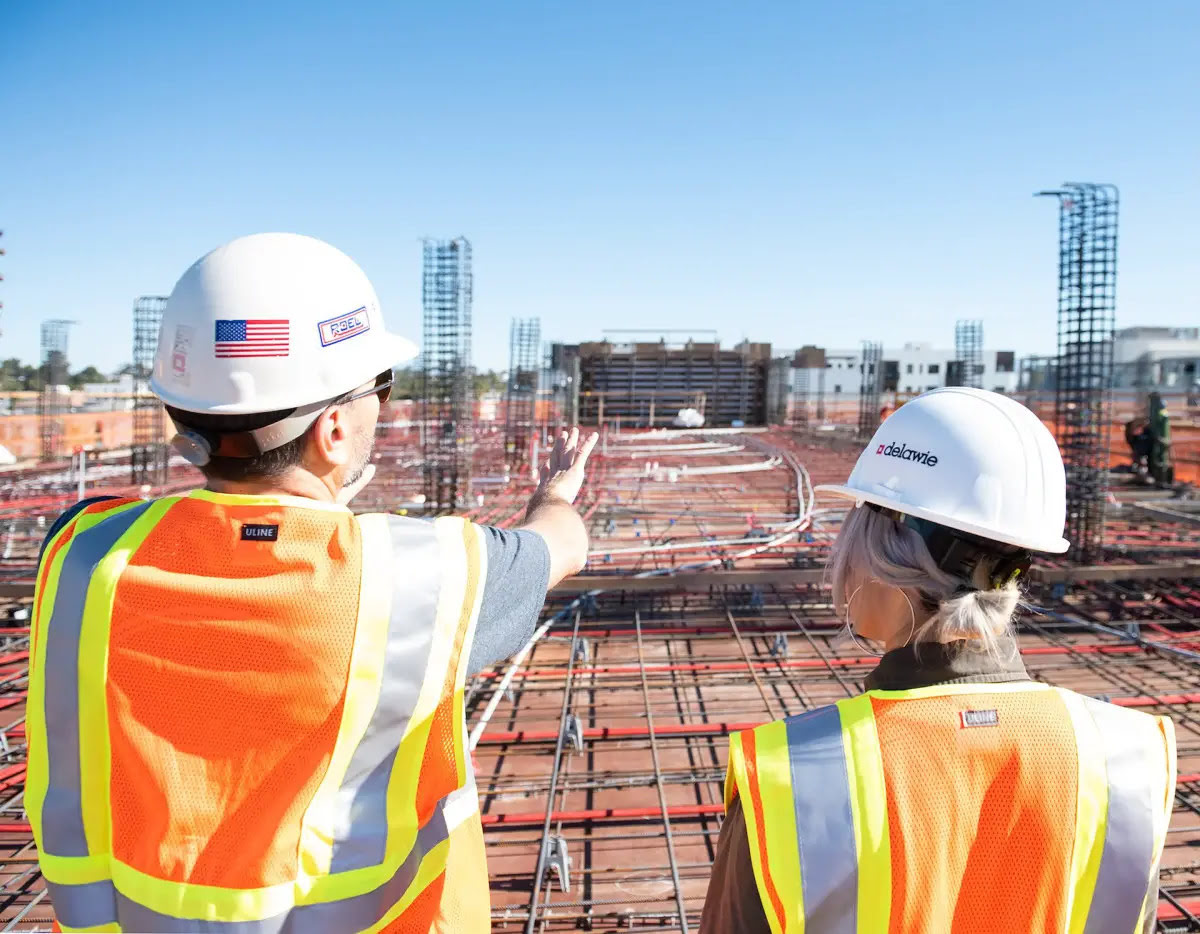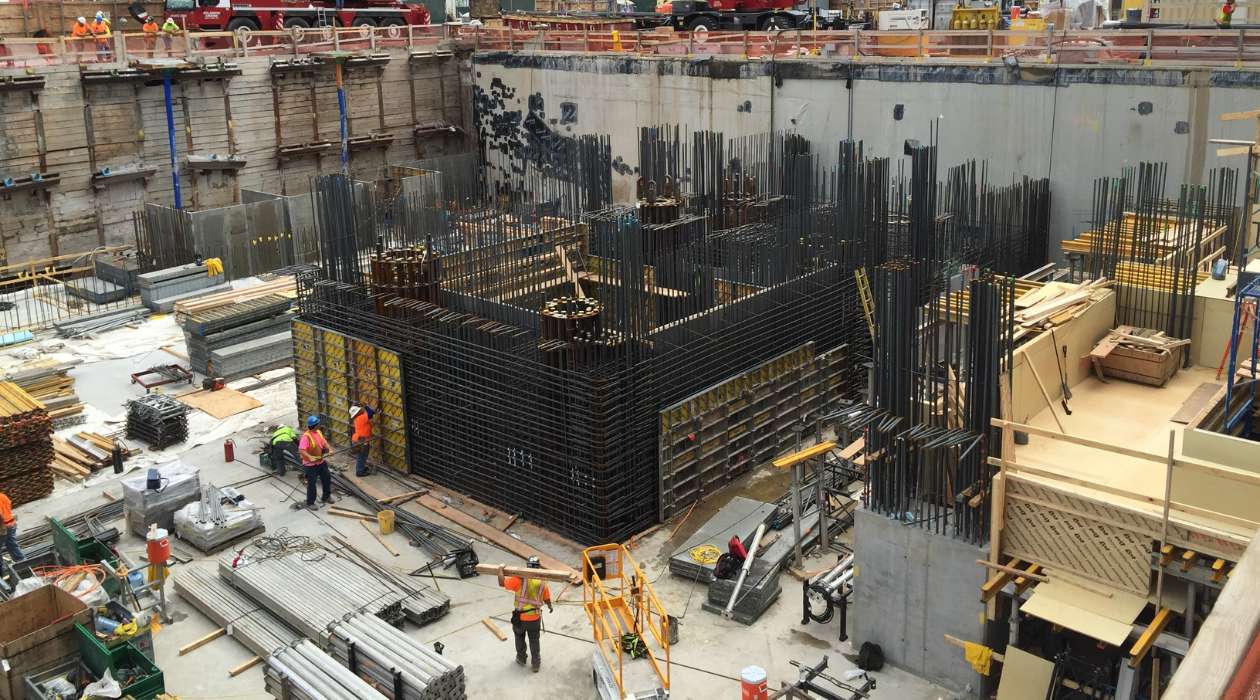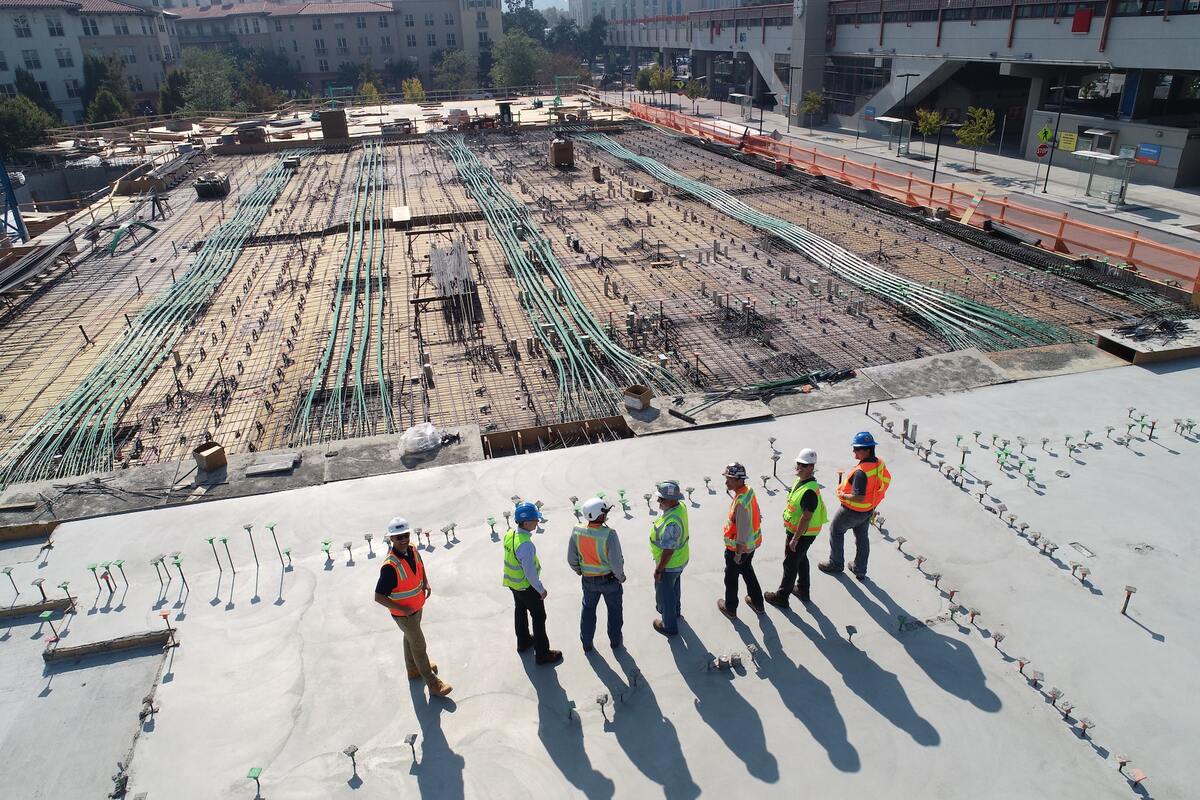Home>diy>Building & Construction>What Makes A Successful Construction Company


Building & Construction
What Makes A Successful Construction Company
Modified: February 25, 2024
Discover the key factors that contribute to the success of a building construction company. Learn how to excel in the competitive construction industry and drive growth.
(Many of the links in this article redirect to a specific reviewed product. Your purchase of these products through affiliate links helps to generate commission for Storables.com, at no extra cost. Learn more)
Introduction
In the fast-paced and competitive world of construction, what sets apart a successful construction company from the rest? Is it the ability to complete projects on time and within budget? Or is it the quality of work and attention to detail? While these factors should be a given, there are several other crucial elements that contribute to the success of a construction company.
In this article, we will delve into the key factors that make a construction company successful. From core values and culture to financial stability and client satisfaction, we will explore the essential elements that set successful construction companies apart from their competitors.
So, if you’re a construction company striving for success or a construction professional looking to understand the secrets behind thriving construction companies, read on to discover the recipe for success in the construction industry.
Key Takeaways:
- Successful construction companies prioritize core values, strong leadership, effective communication, skilled workforce, safety, quality assurance, financial stability, strategic planning, client satisfaction, and innovation for long-term success.
- By fostering a positive company culture, embracing innovation, and delivering exceptional service, construction companies can build a stellar reputation, exceed client expectations, and thrive in a dynamic and competitive industry.
Core Values and Culture
One of the fundamental pillars of a successful construction company is the establishment of strong core values and a positive company culture. Core values define the company’s beliefs, principles, and ethics, while culture encompasses the shared attitudes, behaviors, and values within the organization.
A construction company with well-defined core values and a positive culture creates a sense of unity, fosters teamwork, and inspires employees to perform at their best. These values guide decision-making processes and shape the company’s reputation in the industry.
Successful construction companies often prioritize core values such as integrity, honesty, accountability, and respect. These values are embedded in every aspect of the company’s operations, from the way they interact with clients and subcontractors to how they handle challenges and deliver projects.
Moreover, a positive company culture promotes employee engagement, satisfaction, and retention. When employees feel valued, supported, and recognized for their contributions, they are more likely to be motivated and committed to delivering high-quality work.
Creating a strong company culture involves fostering open communication, providing training and development opportunities, and promoting a healthy work-life balance. By nurturing a positive environment, construction companies can attract top talent and build long-term relationships with clients and partners.
In summary, a successful construction company understands the importance of establishing core values and fostering a positive company culture. These elements not only shape the company’s reputation but also contribute to employee satisfaction, teamwork, and overall success.
Strong Leadership
Strong leadership is a crucial factor that contributes to the success of a construction company. Effective leaders provide direction, make informed decisions, and motivate their teams to achieve goals and deliver projects with excellence.
One key aspect of strong leadership in the construction industry is the ability to build and maintain a capable and skilled workforce. Successful leaders understand the importance of hiring the right people for the job and providing them with the necessary training and development opportunities to enhance their skills and knowledge.
Additionally, strong leaders in construction companies possess excellent communication skills. They are adept at clearly conveying expectations and instructions to their team members, as well as maintaining open lines of communication to address any concerns or challenges that may arise during a project.
Furthermore, effective leaders in the construction industry prioritize fostering a positive and collaborative work environment. They encourage teamwork, collaboration, and mutual respect among team members, promoting a culture of inclusivity and innovation.
Another essential trait of successful construction leaders is their ability to adapt and problem-solve in a fast-paced and dynamic industry. They are adept at analyzing risks, making informed decisions, and implementing effective solutions to overcome challenges and ensure project success.
Moreover, strong leaders in construction companies lead by example. They demonstrate a strong work ethic, integrity, and commitment to delivering high-quality results. By setting high standards and holding themselves and their team members accountable, they inspire trust and confidence from clients, subcontractors, and employees.
In summary, strong leadership is a critical component of a successful construction company. Effective leaders guide their teams, foster a positive work environment, make informed decisions, and adapt to changing circumstances. By exhibiting these qualities, construction companies can thrive and achieve long-lasting success in the industry.
Effective Communication
Effective communication is a foundational element for success in the construction industry. With numerous stakeholders involved in every project, including clients, architects, engineers, subcontractors, and suppliers, clear and efficient communication is vital to ensure smooth operations and project delivery.
Construction companies that prioritize effective communication are better equipped to address challenges, avoid misunderstandings, and mitigate risks. Effective communication promotes collaboration, minimizes errors, and results in timely and successful project completion.
One aspect of effective communication in construction is the ability to clearly articulate project requirements, expectations, and deadlines. This includes providing accurate and detailed project documentation, such as architectural plans, specifications, and contracts. Clear communication at the start of a project helps set the right expectations and minimizes potential disputes or changes down the line.
Additionally, successful construction companies foster open lines of communication among all project stakeholders. Regular meetings, both in person and virtually, allow for the exchange of information, updates, and feedback. This ensures that everyone involved in the project is on the same page and can address any issues or concerns proactively.
Another crucial aspect of effective communication is active listening. Construction professionals who actively listen to their clients, subcontractors, and team members gain valuable insights and demonstrate a genuine commitment to understanding and meeting their needs. This builds trust, strengthens relationships, and enhances overall project outcomes.
Furthermore, technology plays a significant role in facilitating effective communication in the construction industry. Project management software, virtual meeting platforms, and collaboration tools enable real-time sharing of information, progress tracking, and seamless communication among team members regardless of their physical location.
In summary, effective communication is key to success in the construction industry. By prioritizing clear and efficient communication, construction companies can minimize misunderstandings, foster collaboration, and deliver successful projects that meet the expectations of all stakeholders involved.
Skilled Workforce
A skilled workforce is an essential ingredient for the success of any construction company. The construction industry demands a range of specialized skills and expertise to execute projects effectively and deliver high-quality results.
Successful construction companies prioritize hiring and retaining skilled professionals who possess the necessary technical knowledge and expertise required for their specific roles. This includes architects, engineers, project managers, skilled craftsmen, and other professionals involved in the construction process.
Having a skilled workforce ensures that the construction company can handle complex projects, adapt to evolving technologies and industry standards, and deliver projects on schedule and within budget.
Moreover, investing in continuous training and development programs for employees is crucial to keep up with the latest industry trends and advancements. This not only enhances their skills but also contributes to their job satisfaction and motivation.
Additionally, a skilled workforce contributes to improved productivity and efficiency on construction sites. With the right expertise, workers can perform their tasks accurately and efficiently, preventing costly errors and delays.
Successful construction companies also value teamwork and collaboration among their employees. By fostering a supportive and inclusive work environment, construction companies can harness the collective skills and talents of their workforce, leading to innovative solutions and improved project outcomes.
Furthermore, construction companies that prioritize the well-being and safety of their workforce often attract and retain top talent. Implementing robust safety protocols and providing appropriate training and protective gear demonstrate the company’s commitment to employee welfare and contribute to a positive work environment.
In summary, a skilled workforce is crucial for the success of a construction company. By hiring and retaining professionals with the right expertise and investing in continuous training and development, construction companies can deliver quality projects, achieve high productivity, and stay ahead in a competitive industry.
Read more: How To Make Your Construction Company Grow
Emphasis on Safety
Safety is paramount in the construction industry, and successful construction companies place a strong emphasis on creating a safe working environment for their employees and subcontractors. Prioritizing safety not only protects workers from potential hazards but also leads to improved project outcomes and increased client satisfaction.
Construction companies that prioritize safety understand the importance of comprehensive safety protocols and procedures. They develop and implement safety programs to educate employees and subcontractors about potential risks and the proper safety measures to mitigate them.
Successful construction companies also invest in the necessary safety equipment and ensure that it is regularly inspected and maintained. This includes providing personal protective equipment (PPE) such as hard hats, safety goggles, gloves, and harnesses, as well as implementing fall protection systems and fire prevention measures.
Regular safety training and workshops are crucial to keep employees up to date with industry best practices and regulations. Construction companies conduct safety drills and provide ongoing training to address new risks and safety concerns that may arise during different phases of a project.
Moreover, successful construction companies foster a safety culture that permeates every level of the organization. This entails creating an environment where workers feel comfortable reporting safety concerns, near misses, or incidents without fear of retaliation. Open communication channels and regular safety meetings ensure that safety remains a top priority and that all risks are promptly addressed.
In addition to protecting the workforce, safety measures also contribute to project success. By proactively identifying and mitigating potential safety risks, construction companies minimize the chances of accidents, delays, and costly rework. This, in turn, leads to improved productivity and project efficiency, as well as enhanced client satisfaction.
In summary, placing a strong emphasis on safety is a hallmark of successful construction companies. By prioritizing comprehensive safety protocols, providing the necessary training and equipment, and fostering a safety culture, construction companies can protect their workforce, enhance project outcomes, and maintain a stellar reputation within the industry.
Focus on building a strong reputation for quality work and excellent customer service. Satisfied clients will lead to repeat business and referrals, which are crucial for long-term success in the construction industry.
Quality Assurance
Quality assurance is a crucial aspect of the success of any construction company. It encompasses processes, procedures, and checks that ensure that projects are completed to the highest standards and meet or exceed client expectations.
Successful construction companies have robust quality assurance programs in place to monitor and control every aspect of the construction process. This includes incorporating quality control measures throughout all stages of the project, from design and procurement to construction and handover.
One key component of quality assurance is adhering to industry standards and regulations. Construction companies ensure that all materials, equipment, and installations comply with the necessary codes and standards for safety, durability, and functionality.
Additionally, successful construction companies conduct regular inspections and tests to verify the quality of workmanship and materials. This includes on-site inspections, laboratory testing, and quality checks at various milestones of the project.
Quality assurance extends beyond the construction phase. It also involves thorough documentation and record-keeping, including detailed project specifications, drawings, and inspection reports. This documentation enables transparency and accountability, ensuring that all parties involved are aware of project requirements and milestones.
Furthermore, successful construction companies prioritize creating a feedback loop with clients to assess their satisfaction and address any concerns or issues. This allows for continuous improvement and ensures that the company remains responsive and committed to delivering high-quality projects.
Quality assurance measures also contribute to the longevity and durability of the constructed assets. By ensuring the use of quality materials and proper construction techniques, construction companies can minimize future maintenance and repair costs for the client.
Ultimately, a commitment to quality assurance sets successful construction companies apart. By consistently delivering projects of the highest quality, these companies build a reputation for excellence, gain client trust, and secure repeat business and referrals.
In summary, quality assurance is a critical factor in the success of a construction company. By implementing rigorous quality control measures, adhering to industry standards, and prioritizing client satisfaction, construction companies can guarantee the delivery of projects that meet or exceed expectations and maintain their competitive edge in the industry.
Financial Stability
Financial stability is a key aspect of a successful construction company. The ability to manage finances effectively ensures the company’s sustainability, enables investment in growth opportunities, and builds a solid foundation for long-term success.
Successful construction companies prioritize financial planning and management. They maintain meticulous records of income, expenses, and cash flow, allowing them to track project costs, identify areas of profitability, and make informed financial decisions.
Additionally, construction companies with strong financial stability have access to sufficient working capital to support their operations. This includes having appropriate funding for equipment and material purchases, payroll, and unexpected expenses that may arise during a project.
Adequate financial stability also enables construction companies to secure bonding and insurance, which are essential for bidding on larger projects and protecting themselves and their clients in case of unforeseen events.
Furthermore, successful construction companies manage their costs and expenses efficiently. They negotiate favorable contracts with suppliers and subcontractors, analyze and control project budgets, and implement cost-saving measures without compromising on quality.
Financial stability also depends on maintaining healthy relationships with clients. Construction companies that prioritize fair and transparent pricing, timely invoicing, and prompt payment collection ensure a steady cash flow and minimize financial risks.
Moreover, successful construction companies diversify their revenue streams to mitigate the risks associated with fluctuations in the construction industry. They explore opportunities in different sectors, expand their service offerings, and adapt to market demands to sustain their financial stability.
In summary, financial stability is crucial for the success of a construction company. It enables effective financial planning, access to working capital, cost management, and the ability to navigate challenges and seize growth opportunities. By maintaining financial stability, construction companies can build a solid foundation for long-term success and withstand the inherent cyclical nature of the industry.
Strategic Planning and Project Management
Strategic planning and project management are essential components of a successful construction company. The ability to effectively plan and manage projects from inception to completion ensures efficient operations, optimal resource utilization, and the achievement of project objectives.
Successful construction companies invest time and effort in strategic planning, setting clear goals, and developing a roadmap for project success. This involves conducting thorough feasibility studies, assessing potential risks and challenges, and developing a comprehensive project plan that outlines timelines, budgets, and resource allocation.
Additionally, effective project management is critical for the successful execution of construction projects. Construction companies employ experienced project managers who are skilled in managing complex construction projects, coordinating various stakeholders, and ensuring project milestones are met.
Project managers oversee all aspects of a project, including procurement, scheduling, budgeting, and quality control. They employ project management methodologies and tools to streamline processes, mitigate risks, and optimize project outcomes.
Successful construction companies prioritize effective communication and collaboration among project teams. Regular team meetings, progress reports, and active stakeholder engagement contribute to transparent and effective project management.
Moreover, successful construction companies embrace technology to enhance project management processes. Project management software, Building Information Modeling (BIM), and other digital tools enable effective collaboration, real-time progress tracking, and streamlined communication among project teams.
Strategic planning also involves considering long-term growth and sustainability. Successful construction companies assess market opportunities, diversify their project portfolio, and make informed decisions that align with their overall business strategy.
Additionally, project managers are responsible for monitoring and evaluating project performance. They conduct regular performance reviews, identify areas for improvement, and implement lessons learned to continually enhance project management processes.
In summary, strategic planning and project management are crucial for the success of a construction company. By setting clear goals, employing strong project management practices, and leveraging technology and effective communication, construction companies can ensure efficient project execution, meet client expectations, and achieve long-term success in the industry.
Client Satisfaction
Client satisfaction is a cornerstone of success in the construction industry. Satisfied clients not only become repeat customers but also serve as advocates for the construction company, recommending their services to others. Therefore, successful construction companies prioritize delivering exceptional service and exceeding client expectations.
One key aspect of ensuring client satisfaction is effective communication. Construction companies that maintain open lines of communication, promptly respond to client inquiries, and provide regular project updates foster trust and transparency. Clients feel reassured and informed throughout the construction process, leading to higher satisfaction levels.
Understanding and meeting client needs is also crucial for client satisfaction. Successful construction companies take the time to thoroughly assess and understand client requirements, preferences, and budget limitations. They collaborate closely with clients throughout the project to ensure that their vision is translated into reality.
Quality is another significant factor in client satisfaction. Construction companies that deliver high-quality results, attention to detail, and superior craftsmanship demonstrate their commitment to excellence. This contributes to client satisfaction and builds a reputation for quality work.
Timeliness is also crucial in satisfying clients. Construction companies that complete projects on schedule show respect for client time constraints and minimize disruptions to their operations. Adhering to agreed-upon timelines demonstrates reliability and professionalism.
Successful construction companies also prioritize post-project follow-up and support. They conduct client satisfaction surveys or interviews to gather feedback, address any concerns that may arise, and ensure that the client’s expectations were fully met. This commitment to ongoing support helps maintain long-term relationships with clients.
Furthermore, construction companies that prioritize exceptional customer service elevate the client experience. Going above and beyond to provide personalized service, promptly addressing any issues, and maintaining a positive and professional demeanor contribute to high levels of client satisfaction.
In summary, client satisfaction is an essential aspect of success in the construction industry. By focusing on effective communication, understanding and meeting client needs, delivering quality work, adhering to timeliness, and providing exceptional customer service, construction companies can exceed client expectations, foster long-term relationships, and secure a positive reputation in the industry.
Innovation and Adaptability
Innovation and adaptability are key factors that contribute to the success of a construction company in today’s ever-evolving industry. Construction companies that embrace innovation and possess the ability to adapt to changing circumstances are better equipped to stay ahead of the competition and meet the evolving needs of clients.
Successful construction companies foster a culture of innovation, encouraging employees to think creatively and explore new technologies, processes, and materials. They actively seek out innovative solutions that can enhance productivity, improve project outcomes, and deliver added value to clients.
Embracing technological advancements is a key aspect of innovation in the construction industry. Construction companies leverage technologies such as Building Information Modeling (BIM), drones, virtual reality, and IoT (Internet of Things) devices to streamline processes, improve collaboration, and enhance project visualization and communication.
Furthermore, successful construction companies continually invest in research and development to stay informed about emerging trends and new construction methodologies. They attend industry conferences, participate in innovation initiatives, and collaborate with technology providers to stay at the forefront of innovative practices.
Adaptability is also crucial in a rapidly changing industry. Construction companies must be capable of responding to unexpected challenges, shifting market demands, and regulatory changes. They adapt their strategies, processes, and resources to navigate uncertainties and seize new opportunities.
Adaptable construction companies are quick to embrace new market trends and seize growth opportunities. They diversify their project portfolio, explore new sectors, and expand their service offerings to meet evolving client demands and market dynamics.
Moreover, successful construction companies foster a culture of learning and continuous improvement. They encourage employees to develop new skills, stay updated with industry advancements, and adapt to new technologies and methodologies. This adaptability not only enhances the company’s capabilities but also contributes to employee satisfaction and growth.
In summary, innovation and adaptability are vital for the success of a construction company. By fostering a culture of innovation, embracing new technologies, staying adaptable to changing circumstances, and continuously seeking improvement, construction companies can position themselves as industry leaders, deliver innovative solutions to clients, and thrive in a dynamic and competitive market.
Conclusion
In conclusion, the success of a construction company rests on several key factors. By understanding and prioritizing these factors, construction companies can position themselves for long-term success and build a stellar reputation within the industry.
Core values and a positive company culture serve as the foundation for success, fostering teamwork and inspiring employees to deliver their best work. Strong leadership provides direction, facilitates effective communication, and guides the company towards its goals.
A skilled workforce ensures that projects are executed with precision and expertise, while a relentless emphasis on safety protects workers and enhances project outcomes. Quality assurance measures provide clients with confidence in the construction company’s capabilities and deliverables.
Financial stability enables construction companies to navigate challenges, invest in growth opportunities, and sustain their operations. Strategic planning and project management ensure efficient operations, optimal resource allocation, and the achievement of project objectives.
Client satisfaction is paramount for success, and construction companies achieve this by fostering effective communication, understanding client needs, delivering quality work, adhering to timelines, and providing exceptional customer service.
Lastly, innovation and adaptability allow construction companies to stay ahead of the curve, embrace new technologies, and meet the evolving demands of the industry and clients.
By synergizing these factors, construction companies can create a recipe for success. It is important for construction professionals and companies to continuously evaluate and improve upon these aspects to stay competitive and thrive in today’s dynamic construction industry.
So, whether you are a construction company aiming for success or a professional in the industry, remember that by embodying these principles, you can build a path to prosperity and establish a name as a trusted and successful construction company.
Frequently Asked Questions about What Makes A Successful Construction Company
Was this page helpful?
At Storables.com, we guarantee accurate and reliable information. Our content, validated by Expert Board Contributors, is crafted following stringent Editorial Policies. We're committed to providing you with well-researched, expert-backed insights for all your informational needs.














0 thoughts on “What Makes A Successful Construction Company”